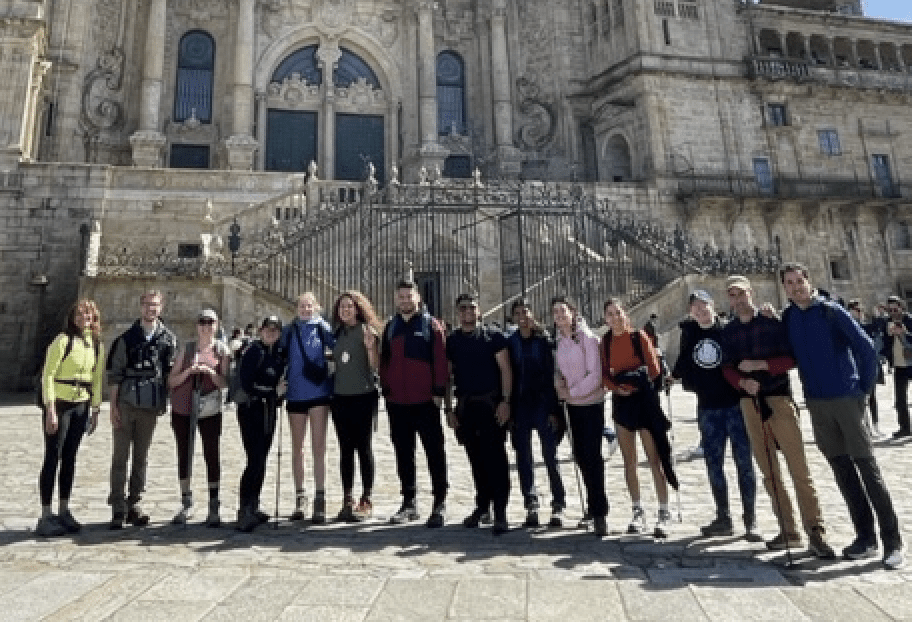
Spanish and Portuguese Lecturer Ginette Alomar Eldredge and the 11 students in her study abroad program trip spent their spring break in Spain on a cultural pilgrimage. This year marked the inaugural offering of this three-credit course by UMD’s Education Abroad and the School of Languages, Literatures, and Cultures (SLLC). This program will be running again next year as part of the series of the Spanish and Portuguese study abroad programs taught in English.
Becoming part of a 1,000-year-old tradition, Eldredge’s class embarked to walk the final 78 miles of El Camino de Santiago or the Road to Santiago, since it culminates in Santiago de Compostela, the capital of northwest Spain’s Galicia region. The route is also known as Saint James Way as the pilgrimage ultimately leads to the shrine of the Biblical apostle St. James. One of three major pilgrimage routes from the Middle Ages, El Camino continues to inspire pilgrims from around the world–including Eldredge and her class.
Open to all majors looking to become global citizens and explore new cultural traditions, Eldredge’s annual course explores the significance of pilgrimage on individuals and society. Students study and discuss pilgrimage narratives, literature, poetry and music that explore the importance of pilgrimage in medieval times, a historic tradition that has transcended centuries.
In preparation for their week abroad, this year’s students attended four on campus lectures where they learned about the history, artistry, folklore and literature they would encounter. Once in Spain, Eldredge and her class experienced it all firsthand as they walked for a week through historic hamlets, towns and cultural sites along the pilgrimage route.
“El Camino is one of the most popular and relevant pilgrimages in the world,” said Eldredge. “Compostela challenges you to not only go beyond your borders, but to embrace the challenges that will allow you to be transformed.” Eldredge shared that the course gives students the opportunity to interact with a different culture and language while also embarking on a pilgrimage of self-discovery and connection with nature.
Eldredge used the Latin phrase “solvitur ambulando,” which translates to “it is resolved by walking,” as a motto for the course since it has served as a timeless inspiration for pilgrims.
“Pilgrims from diverse backgrounds illustrate the pilgrimage's widespread influence on society,” said neuroscience major and program participant Anna Stamatos ’26. As an example of how transformative walking El Camino can be, Stamatos referenced a line from Antonio Machado's poem that reads ‘Traveler, there is no path, The path is made by walking.’
Spanish and government and politics double major Miriam Stolle ’25 described the study abroad trip as a “life-changing experience,” both at a personal level and academically. “My original expectation for this trip was to explore Spain and see these places that I have been learning about in my studies,” said Stolle. “By the end of the trip, I also gained a new perspective on myself.”
Gabriella Chiasera ’26, a Spanish and microbiology double major, shared a similar reflection. “Embarking on the journey of El Camino allowed me to learn so much about myself and truly contextualize what we have been learning all semester,” said Chiasera. “By teaching me the importance of history, it opened my eyes to a new culture and a new perspective.”
This story was originally published on the School of Languages, Literatures & Cultures website.
_____
Education Abroad and SLLC offer numerous study abroad programs like this one that give students the opportunity to experience new cultures and languages. Explore your options today!
